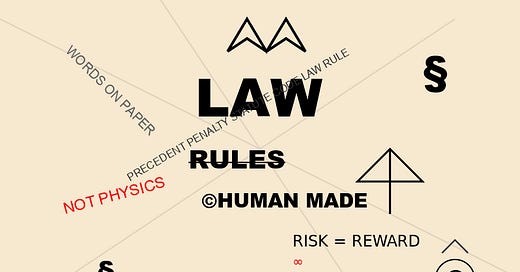Lawyers and how to
Nothing in life is to be feared, it is only to be understood. Now is the time to understand more, so that we may fear less.
The biggest trap in building anything new isn't technology – it's mindset. Nowhere is this more true than in dealing with lawyers and the law. After more than a decade of building and investing, I've seen countless founders get this wrong. Here's the my opinionated truth about working with lawyers.
FIRST PRINCIPLES: WHAT IS LAW, REALLY?
Let's start with the most basic question: What is law? Strip away all the ceremony, and law is simply "a system of rules which a particular country or community recognizes as regulating the actions of its members and which it may enforce by the imposition of penalties."
That's it. No magic. No mysticism. Just written rules with consequences.
Let's break this down further:
Rules are just words written by humans
These words can be interpreted in different ways
"Violations" simply mean failing to comply with these written rules
Consequences are predetermined penalties for these violations
Once you truly internalise this, everything changes.
Law isn't physics – it's not some immutable force of nature. It's more like a game rulebook, with interpretations, strategies, and various ways to achieve your goals. Just as game rules can be interpreted differently by different referees, legal structures can be interpreted and applied in various ways. Just as games evolve with new rules and clarifications, legal frameworks adapt with amendments and precedents.
This demystification is crucial because it shifts your mindset from "what are we allowed to do?" to "how can we structure this to work within the rules?" It's the difference between seeing law as an impassable wall and seeing it as a playing field with boundaries and strategies.
THE THREE TYPES OF LAWYERS🎯
1. THE UNICORNS
These are the 10x lawyers. They think like builders. When you say "I want to revolutionise X," they say "Here's how we can do it legally." They're expensive but WORTH IT. They're partners in building the future, not guardians of the status quo. Working with them absolute pure pleasure for the soul, not so much for your wallet.
2. THE BEHEMOTHS
The "enterprise lawyers." They'll give you exactly what you ask for. No more, no less. Fine for maintenance, not ideal for innovation. If you're trying to move fast and break things (legally), they'll slow you down. They are manageable to work with, if you know what you need to get, and they are acceptable to your wallet at the beginning.
3. THE GOATS
The "Department of No." They worship regulation like religion. They're actively hostile to innovation. Try to avoid. They're not just questionable lawyers; they're innovation killers. They are the hardest to work with, but usually quite cheap.
THE HIGH COST OF CHEAP LAWYERS 💸
Here's something counterintuitive: cheap lawyers are the most expensive thing you can buy. They're technical debt in human form. They don't understand scaling. They don't understand building. They optimise for CYA, not growth.
BUILDING YOUR LEGAL OPERATING SYSTEM 🏗️
If you're building something big, you need more than just lawyers. You need a legal operating system. Here's what that means:
1. BUILD AN INTERNAL TEAM
External lawyers will never match the speed of an internal team that gets your vision. Start building this capability early.
2. REGULATORY STRATEGY IS PRODUCT STRATEGY
In regulated spaces, your relationship with regulators is a strategic asset. Don't delegate this. Own it. Shape it. Build it.
3. SCALABLE PROCESSES > ONE-OFF SOLUTIONS
You need systems that scale across jurisdictions. Think API, not custom code.
THE MOST IMPORTANT THING: IT'S ALL ON YOU 🎯
This is the key that changes everything: YOU MAKE THE DECISIONS. Not your lawyers. Not your board. YOU.
Here's the thing about these decisions: they're fundamentally about risk and return, just like everything else in building. Your lawyers can tell you the risks, but only you can decide if they're worth taking.
Think of it like poker: You don't need to win every hand to win the game. What you need is a clear strategy and solid understanding of the expected value of each decision. Sometimes the right move is folding a decent hand; sometimes it's going all-in on a calculated risk.
I've seen founders agonize over making everything legally perfect, spending millions on legal fees to eliminate every possible risk. That's like folding every hand unless you have a royal flush. You'll never lose big, but you'll bleed out slowly in missed opportunities.
The best founders understand that legal risk, like any other risk, is about portfolio management. They make conscious trade-offs, understanding that some risks are worth taking if the potential return is high enough and the downsides are manageable. They don't try to win every hand – they play for long-term expected value.
Your lawyers are advisors, not decision-makers. They're like your poker coaches – they can teach you the rules and warn you about potential mistakes, but YOU decide when to hold and when to fold.
ACTIONABLE TAKEAWAYS:
1. Own every decision. No exceptions.
2. Build your legal team early if you're scaling.
3. Only work with lawyers who match your speed and vision.
4. Create scalable legal processes.
5. Treat regulatory relationships as strategic assets.
6. Treat legal decisions like portfolio management – focus on long-term expected value, not winning every hand
7. Explicitly calculate the ROI of legal decisions, including opportunity costs
THE BOTTOM LINE 🚀
The law is just another system to be understood and optimized. It's not a wall – it's a path. The winners aren't those who know the most; they're those who best understand how to build within it.
Remember: Everything significant is regulated. Everything new looks illegal at first. Your job isn't to avoid regulation – it's to build the future within it.
Now go build something amazing!



